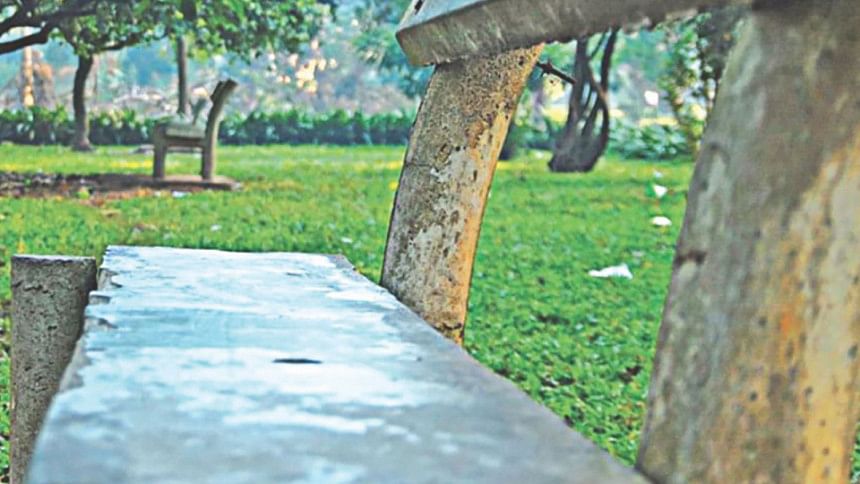Make cities greener, healthier and happier places to live in

Against the backdrop of the ever-increasing rate of deforestation and encroachment in almost every country in the world including Bangladesh, every year since 2012, March 21 has been celebrated as International Day of Forests. In 2012 the United Nations General Assembly declared this global day of celebration aimed at raising awareness of the importance of all types of trees and woodland. The theme of the day this year focuses on making cities a greener, healthier, happier place to live in as a follow-up to last year's theme, "Forests and Sustainable Cities".
For a city like Dhaka, this is all the more relevant, as it has been experiencing fast-declining green coverage over the last 60 years while witnessing an unsustainable expansion of the city with a rapid growth in its population from a mere 2 million to 20 million. Other cities in Bangladesh have also been growing in an unplanned and unsustainable way mostly encroaching upon the last forests!
Going down the memory lane, in the early 1960s, we grew up in a Dhaka that was surrounded by gardens and lush greenery! Whoever entered the town by steamer or boat over the River Buriganga could see the heavy cover of trees along its banks. From Sadarghat to Segunbagicha, one could enjoy the shade of thousands of tall trees, some hundred years old, on the very narrow road or surrounding small houses. There were so many parks and gardens, canals and lakes where we used to play, roam around or swim in the daytime. The sound of different birds chirping resonated through the thick concentration of trees—in Balda Garden, Ramna, Dhaka University, Eden Garden, Farmgate, Khejurbagan, Azimpur, Kalabagan, Kathalbagan, Old Tejgaon Airport, Mohakhali, Santinagar, Nakhalpara, Begunbari and Dholaikhal area. Very few motorised vehicles used to ply on the small roads. Only a few buses and horse carriages known as "tom toms" were the transports we used. So pollution was at its lowest. Some small industries were located here and there in Old Dhaka and Tejgaon or Dholaikhal area. We had to go home before sunset as foxes, wild cats and other animals came out by then from the bushes and forests! Some of our pets would become victims of those wild animals.
At that time, Dhaka was expanding with its economic growth hand in hand with its population boom. Gone are the wooden or steel bridges from over the canals and lakes across the town. Hundreds of canals have been encroached upon. Dhanmondi, Banani, Mohammadpur, Mirpur and Gulshan were built chopping down millions of age-old trees and encroaching upon wetlands in the 1960s initially and from 1980s onwards after. We have been witnesses to the continuous depletion of forest land and indiscriminate tree cutting in Dhaka and its surrounding areas over the last decades. Ramna Racecourse Maidan where Bangabandhu delivered his epic speech of March 7, 1971 also witnessed mass cutting down of trees. So many parks, gardens, ponds, canals have been grabbed by powerful people turning it into a concrete jungle to satisfy their unlimited greed. The entire landscape of our childhood Dhaka has changed so drastically in the last five decades that we are being robbed of all our childhood gardens and playgrounds.
This massacre of Dhaka's greenery can be attributed to the lack of proper city planning and vision. Today, therefore, while celebrating the International Day of Forests, our key takeaway messages of 2019 should be to focus on the benefits of forests and sustainable cities. We can still rescue Dhaka, with proper urban planning which focuses on conserving nature and preserving whatever little forests we have. But it would require strong political will and determination such as that of our late Mayor of Dhaka North, Annisul Huq. With proper planning, budgetary resources and political will, we can surely do it and we can also increase the greenery in other cities to make them sustainable. In the face of changing climate, policymakers have to give more attention to the key role of trees in mitigating the adverse impacts of climate change—as Bangladesh is an innocent victim of global warming with no hand in causing it.
Moreover, there are also positive effects of trees on the local climate. As urban air pollution is rising at an alarming rate, urban trees could act as air filters, removing pollutants and making cities healthier to live in. The role of trees in reducing noise pollution in urban areas should be considered while making policies. The positive impact of urban green spaces should be remembered.
In the 1960s, 70s and even early 80s, we have seen, in different cities of Bangladesh, forests in and around urban areas contributing to water regulation and filtration. This natural water regulation and filtration system, in the last couple of decades, has been destroyed. Dhaka dwellers are now paying the price of those wrong policies.
Some of our experts have also pointed out how urban forests contribute to local economies through city beautification and tourism. But our policymakers have ignored those observations over the years. Those in charge of city management didn't give importance to the role of forests as sources of renewable energy or that trees could be a source of fruits, nuts and leaves for populations. These would be in addition to their maintaining biodiversity and wildlife and conserving the ecosystems.
While International Day of Forests is being celebrated in Bangladesh like in many other countries, the nation should take a vow to help conserve whatever forests are left, pursue greener urban development policies and launch tree-planting campaigns to achieve sustainable cities. Let us make our cities greener, healthier and happier places to live in, as they were during the days of our childhood!
Quamrul Chowdhury is an environment, water, climate and sustainable development specialist and a former chair of UN Kyoto Protocol Joint Implementation Committee and a member of UN Climate Adaptation Committee.
E-mail: [email protected]





Comments